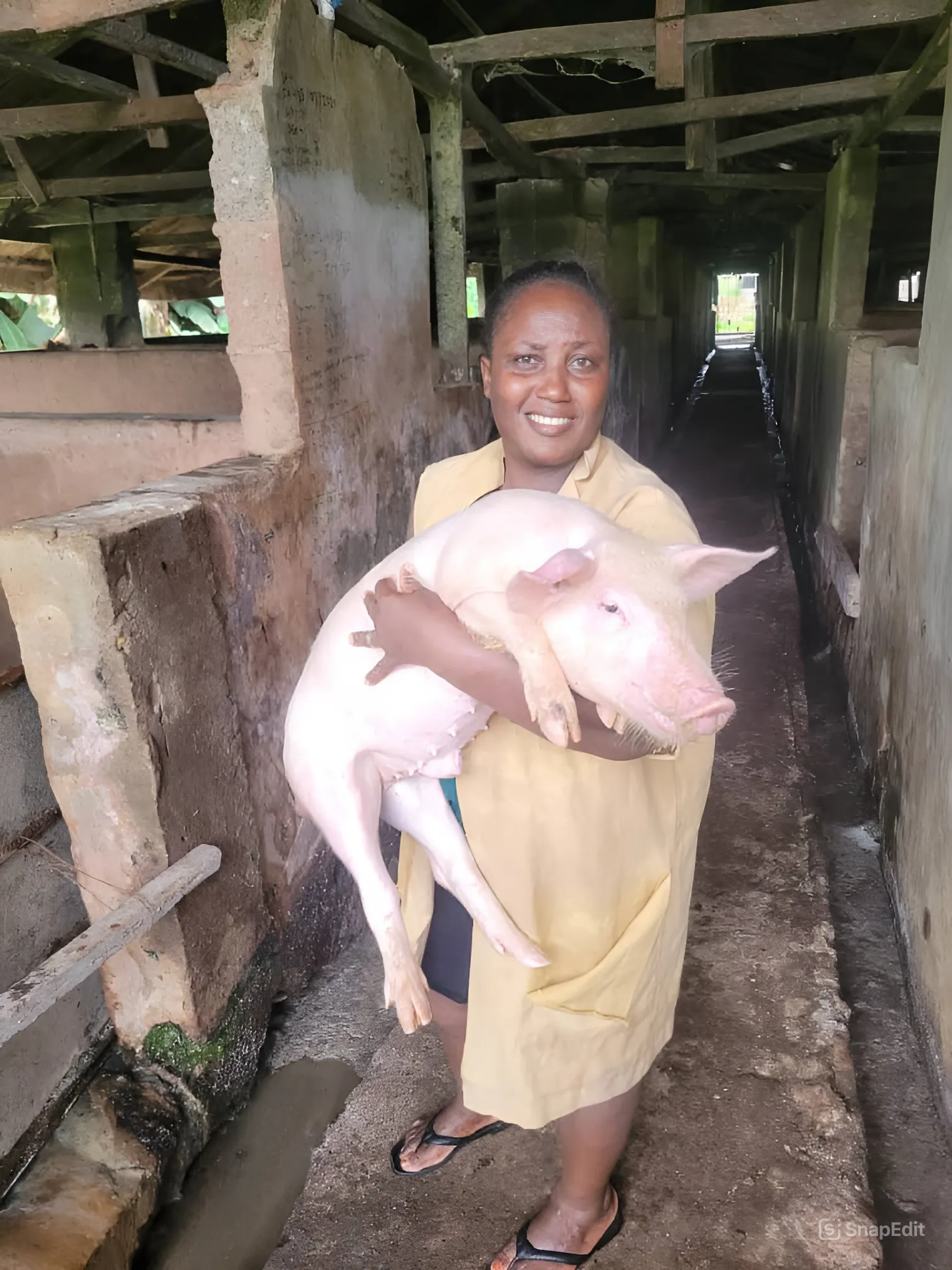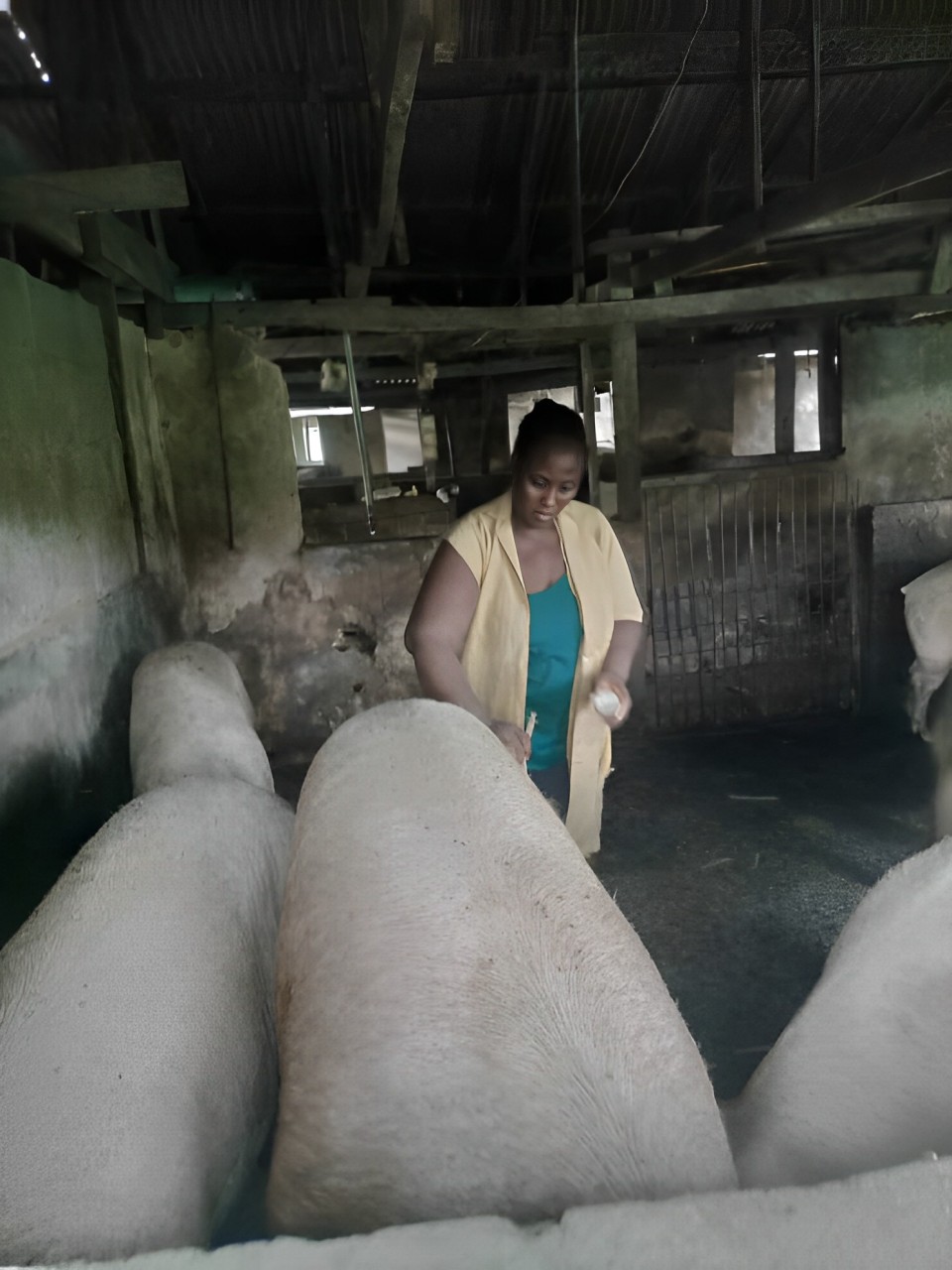
Mrs. Eniola Odusanya’s journey into pig farming began as a passion project alongside her then-boyfriend, now her husband, during their undergraduate years. What started as an undergraduate exploration has grown into a sustainable and profitable business, thriving despite numerous challenges? Now, operating in Ikorodu, Lagos, Mrs. Odusanya has sold over 50,000 pigs, generating several millions of Naira and becoming a respected figure in sustainable pig’s production business.
1. From Undergraduate Students Project to Sustainable Agribusiness
It all began when Mrs. Odusanya and her husband were undergraduates. Intrigued by agriculture, they saw an opportunity in pig farming due to the rising demand for pork in Nigeria. They started small, with just a few pigs and minimal resources. Even in the face of limited funding and space, they committed to a sustainable approach, intending to make a positive environmental impact while turning a profit. Their project quickly turned into a full-fledged business, laying the foundation for a thriving pig farm that continues to grow.
2. Integrating Sustainable Practices
A key factor in the farm’s success is its focus on sustainability, which has been woven into nearly every aspect of its operations. Mrs. Odusanya believes that sustainable practices are essential to long-term profitability and resilience, especially in a market where resources can be scarce. Here are some of the key practices she employs:
- Organic Feed Production: Mrs. Odusanya has prioritized organic feed, sourcing ingredients locally, such as maize, soybean, and cassava peels. By integrating these feed ingredients and cultivating some on-site, she not only reduces her costs but also ensures her pigs are raised on nutritious, chemical-free diets. This approach has the added benefit of appealing to health-conscious consumers looking for naturally raised pork.
- Water Conservation Measures: Recognizing the importance of water in pig farming, Mrs. Odusanya has implemented rainwater harvesting systems, which allow her to collect and store water for cleaning and hydration. By recycling water for non-consumable uses, she significantly reduces her reliance on the local water supply, promoting a more sustainable farming operation.
- Biosecurity Measures: Mrs. Eniola Odusanya controls African swine fever (ASF) and other infectious diseases on her pig farm through strict biosecurity measures. She enforces access control, uses disinfection stations for visitors and staff, and ensures all equipment is sanitized after use. Mrs. Odusanya only sources feed ingredients from trusted suppliers, restricts pig movement, and conducts regular health checks. Quarantine protocols for new pigs also help prevent ASF transmission, contributing to her farm’s overall health and sustainability.
- Feeds production: Mrs. Eniola Odusanya now produces various feeds on her farm, allowing her to provide highly balanced rations at reasonable costs for her pigs, which enhances productivity. This self-sufficiency in feed production minimizes risks associated with external suppliers and ensures her pigs receive optimal nutrition. Combined with her strict biosecurity measures, this approach contributes to the health and sustainability of her farm.

3. Overcoming Challenges with Strategic Support
Establishing the farm wasn’t without obstacles. Mrs. Odusanya faced hurdles in securing adequate funding and battling misconceptions about women’s roles in agriculture. However, with resilience and strategic planning, she successfully tapped into local agricultural programs for support. By collaborating with her husband Seun Odusanya, she gained access to valuable resources and training. This support, combined with Mrs. Odusanya’s unrelenting passion and determination allowed her to build a robust operation that continues to grow despite challenges. Over time, her farm has become a reliable source of income for her family and a model for sustainable pig farming that attracted the attention of the British Broadcasting Corporation a few years ago.
4. The Positive Impact on the Community
Mrs. Odusanya’s success extends beyond financial gains; her farm has created jobs, particularly for women and youth. By sharing her knowledge with aspiring farmers, she is not only empowering others but also fostering a culture of sustainable practices in her community. Her commitment to sustainability has inspired neighboring farms to adopt eco-friendly practices, amplifying her impact on the local ecosystem.
Furthermore, Mrs. Odusanya’s story has encouraged more women to pursue careers in agriculture, challenging gender stereotypes and contributing to the local economy. Her achievements demonstrate that with vision and commitment, women can lead and thrive in the agricultural sector.
5. Lessons for Aspiring Agripreneurs in Africa
Mrs. Odusanya’s journey offers valuable insights for other agripreneurs seeking to enter the sustainable farming space:
- Start Small, Dream Big: Mrs. Odusanya’s story emphasizes the importance of starting with what you have and scaling up. By reinvesting profits and growing gradually, she was able to achieve a sustainable and profitable operation.
- Embrace Sustainability: Eco-friendly practices can drive profitability by reducing costs and appealing to consumers. Mrs. Odusanya’s emphasis on organic feed, water conservation, and her plans for biogas production demonstrate how sustainability can be integrated into various aspects of farming.
- Leverage Local Support Programs: By collaborating with local agricultural organizations and utilizing microloans, Mrs. Odusanya accessed the training and funds needed to overcome challenges and grow her business. Aspiring farmers should explore similar avenues for support.
6. Looking Ahead: Expanding Horizons
In the future, Mrs. Odusanya plans to diversify her farm’s products, expanding into value-added items like pork sausages and cured meats. Additionally, she envisions forming a cooperative with other female farmers, which will increase their market power and support more women in sustainable farming.While sustainability has already made a mark on her current operations, Mrs. Odusanya’s plans include developing a biogas system to convert pig waste into renewable energy. This next phase will further enhance the farm’s environmental impact by addressing waste management challenges and creating an alternative energy source to reduce operational costs. This forward-looking approach highlights her commitment to continuous improvement and adaptation.
Mrs. Eniola Odusanya’s story is a powerful example of resilience and innovation in sustainable pig farming. From university beginnings to a profitable business, her journey underscores the potential of eco-friendly practices to enhance profitability and impact the community positively. Her experience provides a valuable roadmap for agripreneurs across Africa, proving that with dedication and strategic planning, sustainable farming can indeed be a rewarding venture.

